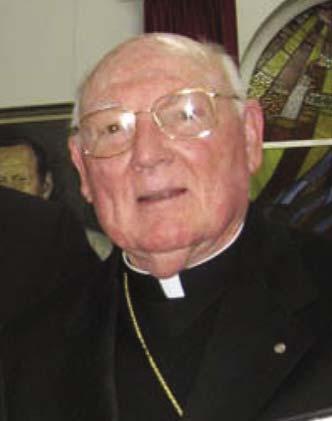
3 minute read
Meaning of the Holocaust to Jewish–Catholic Relations
The Catholic Church had, with Nostra Aetate N.4, adopted a completely new approach to its relationship with the Jewish people, said Cardinal Idris Edward Cassidy (who headed the Commission of the Holy See for Religious Relations with the Jews) in a panel discussion on “The Impact of the Holocaust on Jewish and Christian Theology” with Rev. Tim Costello and Rabbi Fred Morgan, at the Holocaust Centre in July.
He said, faced with the reality of the Holocaust, the Catholic Church, particularly in post-World War II Europe, had to accept the fact that, although the Nazi Socialist ideology was a thoroughly neo-pagan regime and had its anti-Semitism roots outside of Christianity, it was nevertheless obvious that the millennium-old teaching regarding the Jewish people in the Christian world had made it easier for the Nazis to carry out their annihilation campaign. Some members of the Catholic Community had simply closed their eyes to what was happening, while others saw no problem there or even joined in the criminal activity.
Advertisement
In the 1950s, as the horror of the Shoah became more widely known, Catholics began to ask themselves what had happened to Christian understanding of the brotherhood of man and the commandment of Jesus to love even one’s enemies.
The Question of 2000-Year-Old Guilt
Where could one find any justification in the teaching of Jesus for a doctrine that placed the guilt for what had happened almost 2000 years ago on the Jewish people of the twentieth century?
Cardinal Cassidy said it was Pope John XXIII who insisted on relations with the Jewish people being on the agenda of the Second Vatican Council and entrusted Cardinal Bea with the task of preparing a document on the Church and the Jewish people for consideration by the Council Fathers.
Pope John was certainly interested in this by a meeting with Rabbi Abraham Joshua Heschel of the Jewish Theological Seminary in New York, who met the Pope in May 1962. He made four proposals for the improvement of relations between Catholics and Jews, which had a remarkable similarity to certain fundamental elements of the document Nostra Aetate N.4. That document was approved by an overwhelming majority. It has brought about a new theological and practical approach on the part of the Catholic Church to the Jewish people. Nostra Aetate N.4 begins by indicating what the two religions, Christianity and Judaism, have in common, particularly their common roots in the fatherhood of Abraham.
Cardinal Cassidy added that the Church believes that the mission of the Jewish people was not restricted to their historical role as the people of whom Jesus was born, according to the flesh (Rom 9:5) and from whom the Church’s apostles came.
Cardinal Cassidy said in the last decade there had been important contributions leading to a deeper theological understanding of questions of common interest. The most significant of these was undoubtedly the statement published in 2002 in the United States entitled “Reflections on Covenant and Mission”. The document was the fruit of discussions between the Ecumenical and Interreligious Affairs Committee of the United States Conference of Catholic Bishops and the National Council of Synagogues of the USA. The Catholic document concludes with the profound statement: “With the Jewish people, the Catholic Church, in the words of Nostra Aetate, awaits the day, known to God alone, when all peoples will call on God with one voice and serve him shoulder to shoulder.”

Reflections on the Shoah
Cardinal Cassidy explained that it must be clear to all that we had only reached such a possibility as the consequence of the reflection caused by the great tragedy of the Shoah. Also, each year since 2002, there has been dialogue between a special group approved by the Vatican and the Chief Rabbinate of Israel. It has met to discuss the sanctity of life, the value of the family, the relevance of central teachings in the Holy Scriptures which we share for contemporary society and education of future generations.
He added, “I see these theological developments and discussions as a response to the challenge that has come to us from the experience of the Holocaust.”
Cardinal Cassidy concluded with words from We Remember: Reflection of the Shoah, issued by his Commission for Religious Relations with the Jews: “The spoiled seeds of anti-Judaism and anti-Semitism must never again be allowed to take root in any human heart.”








